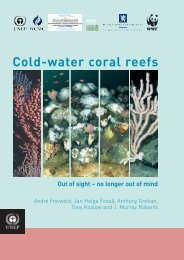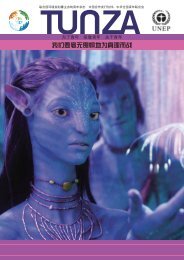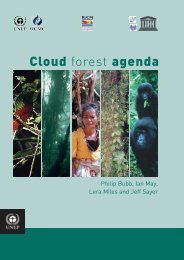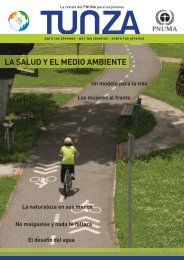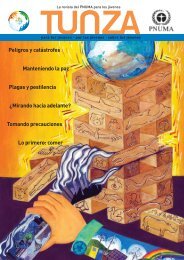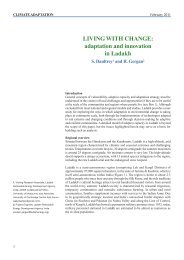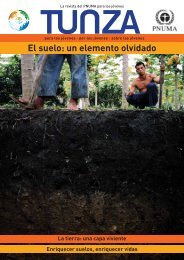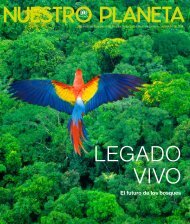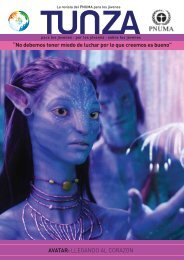Tunza Vol. 8.3 - UNEP
Tunza Vol. 8.3 - UNEP
Tunza Vol. 8.3 - UNEP
You also want an ePaper? Increase the reach of your titles
YUMPU automatically turns print PDFs into web optimized ePapers that Google loves.
Individual action<br />
‘Unfortunately, the most notable<br />
thing about today was the amount<br />
of plastic trash I saw littering the<br />
ocean – the worst I have ever seen it.<br />
I saw about 30 plastic bottles, yoghurt<br />
pots and bits of packaging. There is<br />
something deeply upsetting about<br />
seeing a beautiful blue ocean glinting<br />
in the sunshine marred by a plastic<br />
bottle bobbing along on the surface.’<br />
Turning the tide<br />
So blogged <strong>UNEP</strong> Climate Hero Roz<br />
Savage on her epic solo row across<br />
the Pacific, undertaken to spread<br />
the word about environmental<br />
sustainability. Savage rowed more<br />
than 18,000 kilometres, took 3.5<br />
million oar strokes, and spent 352<br />
days alone at sea in a 7-metre rowing<br />
boat.<br />
She is now raising funds for her next<br />
row, across the Atlantic, Pacific and<br />
Indian Oceans. ‘For me,’ says Savage,<br />
‘the greater achievement is that<br />
people are getting the message that<br />
when it comes to taking care of our<br />
planet, just like my oar strokes, every<br />
individual action counts.’<br />
Message in a bottle<br />
Building a catamaran out of 12,000<br />
plastic bottles and sailing it across the<br />
Pacific sounds pretty crazy. Explorer<br />
and <strong>UNEP</strong> Climate Hero David de<br />
Rothschild and his team did just that,<br />
setting sail in March 2010 on Plastiki<br />
from San Francisco for a 128-day,<br />
15,000-kilometre journey to Sydney,<br />
passing through the North Pacific<br />
Gyre.<br />
David’s idea was to be a ‘message<br />
in a bottle’, calling the world’s<br />
attention to the problem of plastic<br />
pollution in the oceans. The project<br />
was named after explorer Thor<br />
Heyerdahl’s 1947 expedition across<br />
the Pacific on the Kon-Tiki, which<br />
proved that pre-Columbian people<br />
could have sailed from South<br />
America to Polynesia.<br />
‘Waste is a design flaw that doesn’t<br />
occur in nature,’ says de Rothschild.<br />
‘It’s time to rethink the life cycles of<br />
the materials we create, and think<br />
about what happens to them once<br />
they outlive their usefulness.’<br />
Ellen MacArthur<br />
DAME ELLEN MACARTHUR developed a passion for sailing as a child, and by the<br />
age of 20 became the fastest woman – and youngest person – to sail solo around<br />
the world. In February 2005 she broke the world record for the fastest solo<br />
journey circumnavigating the globe: 27,354 nautical miles in fewer than 72 days.<br />
Recently, Ellen MacArthur announced she would quit competitive sailing to launch<br />
the Ellen MacArthur Foundation, which aims to catalyse new ideas, open debate<br />
about sustainable design, and offer young people the tools and skills to carry ideas<br />
forward. Dame Ellen tells TUNZA how she decided to change course.<br />
Q: How did you come to realize you wanted to commit your life to sustainability?<br />
A: Having sailed around the Earth several times, I’ve had to manage everything I<br />
needed on board my boat. I knew that if I ran out of something – diesel, food or even<br />
kitchen roll – it would be impossible to replenish my stock. What I had on board was<br />
all I had, and there was no stopping off for more. Our world is no different: precious<br />
resources such as coal, oil, gas, copper, indium and lithium we have only once. We<br />
need to begin ‘using things’ rather than ‘using things up’! I realized gradually that<br />
the majority of us are totally dependent on resources that won’t be around forever.<br />
What sailing showed me was the meaning of the word ‘finite’. This made me decide<br />
to leave competitive sailing behind.<br />
Q: Please tell us more about the Ellen MacArthur Foundation.<br />
A: The Foundation brings together education and business to help young people<br />
rethink, redesign and build a sustainable future. We’re developing teachers’ toolkits<br />
with materials like case studies, films, slides and more, covering the circular, or<br />
‘closed-loop’, economy, one in which waste becomes an input for another cycle<br />
or process, rather than thrown away. We also offer hands-on workshops aimed at<br />
students aged between 16 and 18, which help them consider how we might live and<br />
work at the end of an era of cheap materials, and give them the opportunity to work<br />
with industry professionals from such fields as energy, transport and consumer<br />
products.<br />
Q: The Ellen MacArthur Cancer Trust takes young people sailing to help their<br />
confidence while recovering from serious illness. Why the focus on young people?<br />
A: In order for us to really begin the transition to sustainability, it will require a whole<br />
generation to think differently and acquire the necessary skills.<br />
Q: Do you intend to keep sailing, or do you plan to devote your time to<br />
environmental work?<br />
A: Yes, I do still sail, both with the Trust and also on Iduna, which I sailed round<br />
Britain when I was 18! And the environment? I prefer to call it working for our<br />
futures!<br />
More from less: Resources and the environment<br />
15



